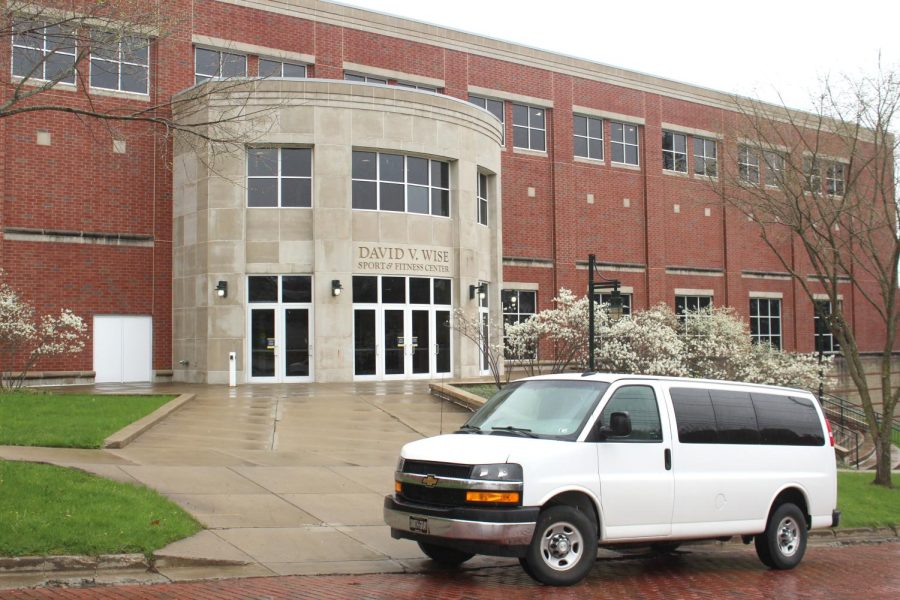Indoor mask mandate in place as cases hit triple digits
ACHA says friend groups, unofficial parties, key areas of transmission
One of the Chevy Express cargo vans from the college’s motor pool idles on Highland Avenue outside the Wise Center. The vans shuttled students that had tested positive to the Quality Inn, and later, Ravine-Narvik Hall.
Allegheny College is in the middle of the largest spike of COVID-19 cases since the beginning of the pandemic more than two years ago. As of Thursday afternoon, 146 students were in isolation after testing positive, or roughly one out of every 10 students, according to the college’s enrollment data.
The spike prompted the Allegheny College Health Agency to mandate masks indoors in an email to the campus community on the evening of Wednesday, April 27. The mandate will expire at 5 p.m. on Wednesday, May 4, with the email noting that if case counts remain high the mandate may be extended.
ACHA itself did not respond to a request for comment on the story, though the college’s press office issued a statement via email to The Campus.
“The vast majority of our campus community has been vaccinated, and we are relieved those in isolation are resting comfortably with minimal symptoms,” the statement read. “Throughout the current academic year, the College’s COVID-19 infection rate has remained well below the state and national average, thanks to the vigilance of our students, faculty and staff and the expertise of our Allegheny College Health Agency … We look forward to a successful conclusion of the academic year as we work to keep the campus community as safe and healthy as possible.”
The source of the outbreak is not, as many have assumed, last week’s Springfest activities and the major concert, the latter of which was attended by around 750 people. Instead, Associate Dean for Community Standards and Wellness Trae Yeckley, who sits on the ACHA advisory board, said that unofficial Springfest activities were points of spread.
“Where we’re seeing the spread is from the unsanctioned college parties, from ‘Loomis Fest’ (and) from the parties at some of the houses,” Yeckley said.
This trend was identified as far back as Monday evening; in its first email to the campus community, ACHA identified friend groups where most of the spread took place.
“None of the infections appear to be ‘random,’” Morrow wrote. “While the student may say ‘I have no idea where I got COVID-19,’ when we review the contact trace reports as a whole, patterns become obvious.”
Monday, April 25, saw 17 vaccinated students test positive; of them, Morrow said that nine were infected from their friend groups and an additional three were infected from their roommates. The total number of students in isolation Monday evening was 27.
That number would roughly double over each of the next two days; ACHA’s Tuesday, April 26, update stated that 29 students had tested positive for a total of 55 active cases, and on Wednesday, April 27, 48 positive tests pushed the total active cases to 109. By 6:30 p.m. on Thursday April 28, that number had increased by 37 cases to 146 total cases, with 85 students in college-provided quarantine.
In their email to the campus community Wednesday evening, ACHA emphasized that there was enough quarantine space for all students who tested positive, and that space was being made available in Ravine-Narvik Hall.
Yeckley said that the quarantine spaces used in Ravine-Narvik had been reserved for the purpose since the beginning of the semester and are separate from other residences.
“We haven’t had to move students and the non-COVID-positive students are safe where they are,” Yeckley said. “Our COVID-positive students are in their own tower (and have) their own bathrooms without interaction with the other (residences).”
Yeckley also said that, where possible, students that test positive should return home.
“If you can isolate at home, we’re going to ask you to go home for a couple of reasons,” Yeckley said. “One, students will be more comfortable, in their house … with their surroundings, their things that are familiar to them. But we (also) want to make sure that we’ve got enough space for students who don’t have the option of going home.”
The rising number of cases has shut down some student activity. The Allegheny Student Government moved their weekly General Assembly meeting online, conducting business over Zoom on Tuesday, April 26.
Additionally, Grounds for Change, the student-run coffee shop on the second floor of the Campus Center, announced via social media on Monday night that they would not be serving coffee for the week beginning April 25.
“With the rising COVID cases the board feels that the smartest thing to do is close for the week and let everything settle back down,” the group wrote on Facebook and Instagram. “Don’t worry, the space will be open but the counter won’t.”
Some students are dissatisfied with ACHA’s response. Adriana Solis, ’23, thought that while a mask mandate was good, it should have been in place since Monday.
“I also don’t think that ACHA is doing the proper amount of contact tracing, because I’ve had two or so people that I spent hours and hours with telling me that they tested positive and that I might get contact traced, and then I never got a contact-trace email,” Solis said.
Yeckley said that the jump in positive cases has led ACHA to shift their method of contact tracing from interviewing those who have tested positive to a Google Form.
“We’ve got a handful of employees who have volunteered to help out with ACHA to make sure that they’re processing those forms and then contacting the people who’ve been contact-traced,” Yeckley said. “What is really going to determine and really make a difference is making sure that students err on the side of caution. If they’re like ‘I was with this person for like 10 minutes, but I don’t really want to contact-trace them,’ I would still contact-trace them.”
Favour Ojo, ’23, was not surprised by the outbreak, but thought that a mandate should have been in place the previous weekend.
“I think there should have been a mandate for the (‘A Boogie’) concert (on April 23), because obviously, that’s where the outbreak came from,” Ojo said.
Though Yeckley acknowledged that the spike came right after the concert, they said the timing of the spike did not line up. It usually takes two to 14 days for symptoms of COVID-19 to appear, with Harvard Medical School pegging five days as “typical” for earlier variants, three to four days for the delta and omicron variants.
“Statistically, it makes sense that there were probably students who have attended the concert who have now tested positive,” Yeckley said. “I don’t think the concert was the super spreader event because … if you’re looking at the timeline, we wouldn’t (have) started seeing the spike until probably yesterday or today. We believe that it was the friend groups partaking in unofficial college Spring Fest activities that started the spread.”
Luis Mendoza, ’22, said the campus community was being lax in responding to the outbreak. He also said that Morrow’s emails felt off to him.
“(I’ve been talking with Mary Walsh-Hilf, ’22, about) just how nonchalantly (Morrow) has been about the whole situation, sending us emails that are kind of scary, and then giving us little quips like, ‘this will all pass over soon guys, don’t worry,’” Mendoza said.
Yeckley acknowledged that, as of Thursday afternoon, there was not enough information to determine if the peak of the outbreak had already passed. However, they did say that most students will be out of isolation by the last day of classes.
“Now that we’re doing the testing on day five … most students are probably looking at being discharged in about a week,” Yeckley said.

Sami Mirza is a senior from many different places. He is majoring in International Studies with a focus on the Middle East and North Africa and minor in...












